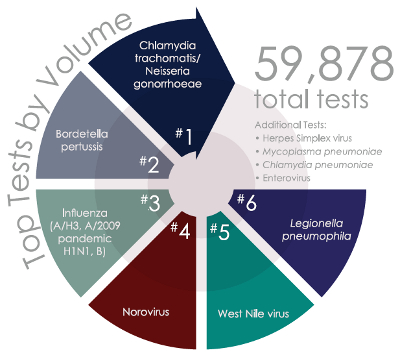Molecular Diagnostics
Molecular diagnostics has become the gold standard for sensitive and specific detection of bacteria and viruses that cause disease. The Hygienic Laboratory's molecular tests target diseases of public health significance. The section also runs statewide surveillance programs in conjunction with the Iowa Department of Public Health.

These surveillance programs are important to the medical community because they provide information about when and where diseases are circulating in the state. In the case of influenza, statewide surveillance also indicates if the strain of virus circulating is a match for the current vaccine. This year the Molecular Diagnostics section experienced record volumes of influenza testing, the most since the 2009 H1N1 pandemic.
Iowa also supports a public health program that diagnoses sexually transmitted diseases like chlamydia and gonorrhea to ensure that individuals are properly treated to prevent further infections. This testing has been decreasing in volume in recent years. Many of these historically funded state programs are being eliminated with the expectation that private insurance will pay for testing of the underinsured and underserved. However, these public health programs have provided reliable surveillance data, prevention and follow-up interventions.
For many years, the Hygienic Laboratory, IDPH and Iowa State University have partnered to survey mosquito-borne diseases throughout the state. Today, mosquitoes are tested to determine the presence of West Nile virus (WNV) and the potential for transmission to humans. When WNV is confirmed, public service messages are released to instruct individuals on how to avoid exposure.
Fiscal year 2013 saw a statewide pertussis epidemic that increased testing volumes to their highest levels since 2005. Pertussis, also known as whooping cough, is an important cause of illness primarily in school-aged children. Healthcare providers are required to report all cases so treatment can be provided to both those afflicted and those in contact with them in order to stop the spread of the disease. The Hygienic Laboratory performs the majority of testing for the state and transmits the results to appropriate state and local health departments for optimal intervention.
Outbreaks of norovirus were also at a record high in Iowa during 2013. The Hygienic Laboratory tested twice as many specimens as in the previous year. Norovirus testing is critical for public health to determine a definitive cause of a gastroenteritis outbreak and optimally target remediation and prevention recommendations.